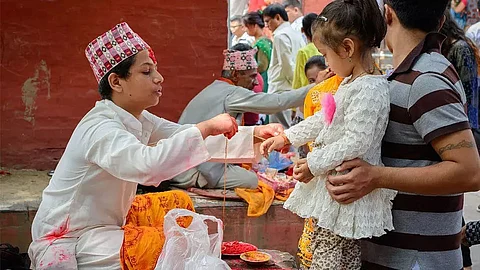
- Home
- Live Blog
- Breaking News
- Top Headlines
- Cities
- NE News
- Sentinel Media
- Sports
- Education
- Jobs

KATHMANDU: Nepal on Thursday observed Janai Purnima, the festival of threads with ritualistic bath (bathing) and tying the sacred thread ‘Rakshya Bandhan’ on the wrist and ‘Janai’ across the body by Hindu devotees.
In the early morning of Thursday, the Batuks- novice priests took part in a mass bathing ceremony chanting hymns and mantras, making offerings to the God Sun and goddesses. Meanwhile, people gathered on the embankments of holy Bagmati river to change and tie threads on their wrists, as the nation marks the festival of thread.
Janai, itself is a sacred thread that is believed to have emerged from the Yagya, sacrificial rite or performance of duty (priest recites religious sermon). A person who wears this sacred thread is full of energy. It has two parts and each part contains three threads (religious sermon), the first is Bramha, the second is Bishnu and the third is Lord Shiva. These are the symbols of knowledge, meditation and power.
Commonly called ‘Janai Purnima’ or ‘Rishi Tarpani’ the ‘tagadharis’ or those who wear the ‘Janai’ (the sacred thread) around their bodies from the left shoulder to right change the sacred thread today after having a haircut and a bath. Those who don’t wear Janai reach the nearby religious site and receive the ‘Raksha Bandhan’ thread, which is tied around the wrist as an amulet. The yellow thread is purified through the chanting of mantras by Brahmin priests as a symbol of protection from fear and disease.
On Janai Purnima, a big religious fair takes place at the Gosainkunda Lake and pilgrims come from faraway places to take a holy dip in this lake and other lakes nearby. Religious fairs are organized at Pashupati and Manichud of Kathmandu; Gosainkunda of Rasuwa; Kumbheshwar of Lalitpur; Panchpokhari of Sindhupalchok; Janakpurdham, Dhanush Sagar and Ganga Sagar of Dhanusha, Dansanghu of Jumla and Trivenidham of Nawalparasi. Along with this, the Buddhists observe this day in commemoration of Lord Gautam Buddha’s victory over the evil power of lust. This episode is well-described in the Buddhist scripture ‘Lalitbistar’. A special fair takes place at Swayambhunath in Kathmandu on this day.
Similarly, Raksha Bandhan is observed mostly by the Madhesi community on this day. Sisters offer ‘rakhi’ (a talisman, a symbol of protection) to their brothers and tie it around their wrists. ANI
Also Watch: